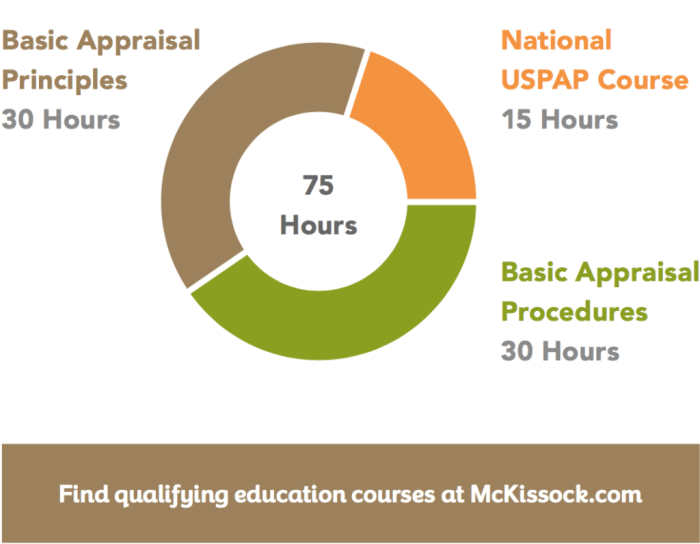How to become an appraiser in nc – Embarking on the path to becoming an appraiser in North Carolina requires a thorough understanding of the educational requirements, licensing process, and ethical considerations involved. This comprehensive guide will navigate you through each step, empowering you to pursue a fulfilling career in the field of appraisal.
To initiate your journey, you must possess a bachelor’s degree in a related field, such as business, economics, or real estate. Additionally, specific courses in appraisal theory, principles, and methods are typically required.
Educational Requirements

Individuals seeking to become appraisers in North Carolina must meet specific educational requirements. These requirements ensure that appraisers possess the necessary knowledge and skills to conduct accurate and reliable appraisals.
To become a licensed appraiser in North Carolina, individuals must complete a minimum of 150 hours of qualifying education. This education must include courses in real estate appraisal principles, methods, and techniques. Additionally, appraisers must complete courses in specific appraisal disciplines, such as residential, commercial, or personal property appraisal.
Qualifying Education
- Real Estate Appraisal Principles
- Real Estate Appraisal Methods
- Real Estate Appraisal Techniques
- Residential Appraisal
- Commercial Appraisal
- Personal Property Appraisal
Licensing Process

The North Carolina Appraiser Licensing Board (NCALB) regulates the licensing and practice of appraisers within the state. To obtain an appraiser license in North Carolina, individuals must meet specific requirements and follow the established licensing process.
The licensing process involves completing an application, passing an examination, and fulfilling continuing education obligations.
Application Process
- Complete and submit an application to the NCALB.
- Provide proof of meeting the educational requirements.
- Submit a certification of experience.
- Pay the required application fee.
Examination Requirements
- Pass the National Uniform Licensing and Certification Examinations (NULCE).
- The NULCE consists of two parts: the Residential Appraiser Qualification Exam (RAQE) and the General Appraiser Qualification Exam (GAQE).
Continuing Education Obligations
- Licensed appraisers must complete 14 hours of continuing education (CE) every two years.
- The CE courses must be approved by the NCALB.
- Appraisers must maintain records of their CE completion.
Experience Requirements

Aspiring appraisers in North Carolina must fulfill specific experience requirements to obtain licensure. These requirements include both general real estate experience and specialized appraisal experience.
General Real Estate Experience
- Hold a valid North Carolina real estate broker’s license for at least two years.
- Complete 1,000 hours of general real estate appraisal experience under the supervision of a licensed appraiser.
Specialized Appraisal Experience
- Complete 1,000 hours of specialized appraisal experience under the supervision of a licensed appraiser.
- This experience must include:
- Preparation of at least 25 appraisal reports.
- Conducting at least 10 site inspections.
- Completion of at least 75 hours of appraisal-related coursework.
Ethical Considerations
Appraisers in North Carolina are bound by a strict code of ethics that governs their conduct and ensures the integrity of the appraisal process. Adhering to these ethical standards is crucial for maintaining the trust and confidence of clients and stakeholders.
The ethical guidelines established by the North Carolina Appraisal Board (NCAB) Artikel the responsibilities and obligations of appraisers, including:
Independence and Impartiality
- Appraisers must maintain independence and impartiality in all appraisal assignments.
- They must disclose any potential conflicts of interest and avoid situations where their personal or financial interests could compromise their objectivity.
Confidentiality
- Appraisers must maintain the confidentiality of all information obtained during the appraisal process.
- They may not disclose any appraisal-related information without the express consent of the client.
Competence
- Appraisers must possess the necessary knowledge, skills, and experience to perform appraisals competently.
- They must stay up-to-date on industry best practices and relevant regulations.
Accuracy and Objectivity
- Appraisers must strive for accuracy and objectivity in their appraisals.
- They must use sound judgment and avoid bias or prejudice in their analysis and conclusions.
Violating these ethical guidelines can have serious consequences, including:
- Suspension or revocation of appraisal license
- Civil or criminal penalties
- Damage to reputation and loss of trust
Career Opportunities
Appraisers in North Carolina enjoy a wide range of career opportunities in various industries and sectors. Their expertise in property valuation makes them valuable assets to organizations seeking to make informed decisions regarding real estate investments and transactions.
Appraisers are employed in the following sectors:
Real Estate
- Residential and commercial property appraisals
- Mortgage lending and underwriting
- Property tax assessment
- Estate planning and settlement
Insurance, How to become an appraiser in nc
- Property damage and loss appraisals
- Business interruption appraisals
- Liability appraisals
Government
- Property tax assessment and equalization
- Eminent domain proceedings
- Land use planning and zoning
Nonprofit Organizations
- Affordable housing appraisals
- Historic preservation appraisals
- Conservation easements appraisals
Professional Development

Professional development is crucial for appraisers in North Carolina to maintain their knowledge and skills in the constantly evolving real estate industry. Attending conferences, workshops, and seminars provides opportunities for appraisers to stay abreast of industry trends, best practices, and legal updates.
Continuing Education
North Carolina requires appraisers to complete 14 hours of continuing education every two years to maintain their licenses. This continuing education must cover topics such as appraisal theory and principles, appraisal techniques, ethics, and North Carolina-specific laws and regulations.
Salary and Compensation
Appraisers in North Carolina can expect a competitive salary and compensation package. Earnings vary depending on factors such as experience, location, and specialization.
According to the Bureau of Labor Statistics, the median annual salary for appraisers in North Carolina is around $58,000. However, experienced appraisers with specialized skills can earn significantly more.
Experience
Appraisers with more experience typically earn higher salaries. This is because they have a deeper understanding of the market and can provide more accurate appraisals.
Location
The location of an appraiser can also affect their salary. Appraisers in large metropolitan areas, such as Charlotte or Raleigh, tend to earn more than those in smaller towns.
Specialization
Appraisers who specialize in a particular type of property, such as commercial or residential, can also earn higher salaries. This is because they have a more in-depth knowledge of the specific market they specialize in.
Job Outlook
The job outlook for appraisers in North Carolina is expected to be positive over the next decade. As the real estate market continues to grow, there will be a need for qualified appraisers to assess the value of properties for various purposes, such as mortgage lending, estate planning, and property tax assessment.
According to the North Carolina Real Estate Appraisers Board (NCREAB), the number of licensed appraisers in the state has increased steadily in recent years. This growth is expected to continue as the demand for appraisal services increases.
Demand for Appraisers
- The demand for appraisers is expected to be driven by several factors, including:
- The increasing number of real estate transactions in North Carolina.
- The growing complexity of the real estate market.
- The need for accurate and reliable appraisals for various purposes.
Resources and Support: How To Become An Appraiser In Nc

Appraisers in North Carolina have access to various resources and organizations that provide support, professional development, and networking opportunities.
These resources include professional associations, government agencies, and educational institutions.
Professional Associations
- North Carolina Chapter of the Appraisal Institute (NCAI): NCAI is a professional organization for real estate appraisers in North Carolina. It offers educational programs, networking events, and advocacy for the appraisal profession.
- National Association of Realtors (NAR): NAR is a trade association for real estate professionals, including appraisers. It provides resources, education, and advocacy for its members.
Government Agencies
- North Carolina Appraisal Board (NCAB): NCAB is the state agency responsible for regulating the appraisal profession in North Carolina. It sets licensing requirements, investigates complaints, and enforces appraisal standards.
- North Carolina Real Estate Commission (NCREC): NCREC is the state agency responsible for licensing and regulating real estate professionals, including appraisers.
Educational Institutions
- Appalachian State University: Appalachian State University offers a Bachelor of Science in Real Estate with a concentration in Appraisal.
- East Carolina University: East Carolina University offers a Master of Science in Real Estate with a concentration in Appraisal.
User Queries
What is the minimum education required to become an appraiser in North Carolina?
A bachelor’s degree in a related field, such as business, economics, or real estate, is required.
How do I obtain an appraiser license in North Carolina?
You must complete the application process, pass the required examinations, and meet the continuing education requirements.
What are the ethical responsibilities of an appraiser in North Carolina?
Appraisers must adhere to the Uniform Standards of Professional Appraisal Practice (USPAP) and maintain objectivity, independence, and confidentiality.